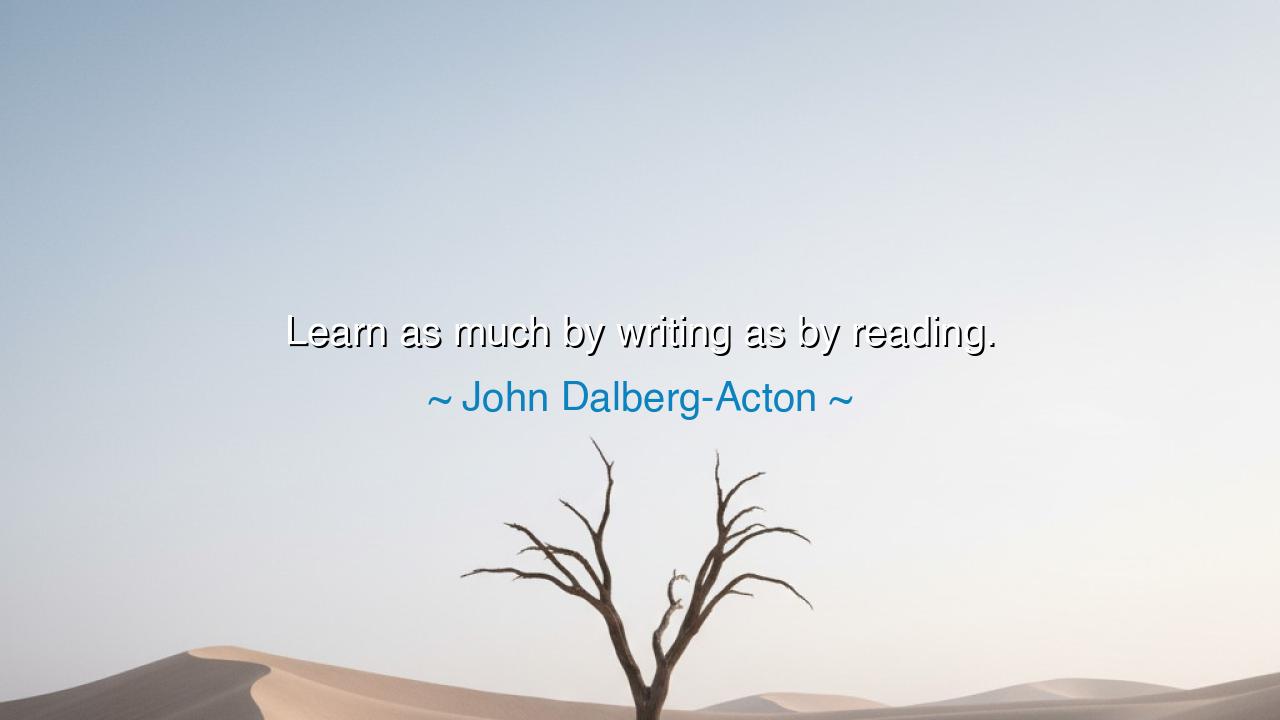
Learn as much by writing as by reading.






“Learn as much by writing as by reading.” — Thus declared John Dalberg-Acton, the great historian and thinker whose mind sought truth beyond the mere repetition of words. In this short but luminous saying lies a secret known to sages and scholars alike: that learning is not only the gathering of wisdom, but also the expression of it. Reading fills the vessel of the mind; writing gives it form, shape, and depth. The one without the other is like inhaling without exhaling — incomplete, stagnant, and without flow. To truly learn, one must not only absorb knowledge, but also release it through the discipline of thought made visible in words.
The act of reading is an invitation to listen — to walk in the gardens planted by others. When we read, we hear the echoes of those who came before us: philosophers, poets, and dreamers who shaped the world with their ideas. Yet reading alone is not mastery. For what enters the mind must be worked upon, examined, and transformed within. This is where writing becomes the forge of understanding. To write is to wrestle with truth, to carve clarity from the chaos of thought, to discover what we truly know — and what we do not.
Every great teacher of antiquity understood this law. Marcus Aurelius, emperor and philosopher, wrote his Meditations not for fame or for others, but as a means to discipline his soul. Each night, he poured his reflections onto parchment, confronting his own weaknesses and solidifying his insights. Through writing, he learned more of himself and of the world than any book could have taught him alone. His writings endure because they were born not from study alone, but from the living union of reading, reflection, and expression. In his silent dialogues with the page, he became both student and teacher — the eternal balance of wisdom.
Writing, then, is the act of making the invisible visible. It is a mirror that reflects the contents of the mind and purifies them through the light of language. When one writes, the thoughts that drift like smoke begin to take shape; the half-formed notions harden into truth or crumble under scrutiny. In this way, one learns as much by writing as by reading — for writing tests knowledge, challenges memory, and demands coherence. Where reading gives inspiration, writing gives understanding. It is the fire that tempers the iron of thought into the blade of insight.
Consider Leonardo da Vinci, whose notebooks brimmed with sketches, musings, and observations. His genius did not flow merely from observation, but from the discipline of recording, questioning, and reasoning through writing. Each word and drawing was a conversation with himself — an exploration of wonder and reason intertwined. Through his pen, he transformed fleeting curiosity into eternal discovery. Like Acton’s wisdom foretells, Leonardo’s learning was doubled by his writing — for he learned not just from the world he observed, but from the words he himself inscribed upon it.
Acton’s quote is not a command to scholars alone, but to all who seek growth. It teaches that true learning is active, not passive. To read is to receive; to write is to respond. Only when both are joined does knowledge come alive. Those who merely read risk becoming vessels of other men’s thoughts; those who write learn to think for themselves. Writing demands courage — to confront one’s ignorance, to risk imperfection, and to wrestle with the truth. But in that struggle, wisdom is born.
So, my child, let this be your practice: Read deeply, and write often. Do not let learning be a still pond, but a flowing river. When you read a book, write what you have felt, not just what you have seen. When you learn a truth, write how it transforms you. Do not wait for mastery to begin — begin, and mastery will come. For each word you write sharpens the mind, strengthens the spirit, and refines the soul.
In the end, learning by writing is not only an act of intellect, but an act of creation. To write is to give life to thought, to shape the unseen into form, to bridge the distance between knowledge and understanding. Books will teach you what others have known — but through your own words, you will discover who you are. Thus, as Lord Acton proclaimed, “Learn as much by writing as by reading,” for in that sacred balance lies the true art of wisdom — the eternal dialogue between the world that teaches, and the mind that dares to answer.






AAdministratorAdministrator
Welcome, honored guests. Please leave a comment, we will respond soon